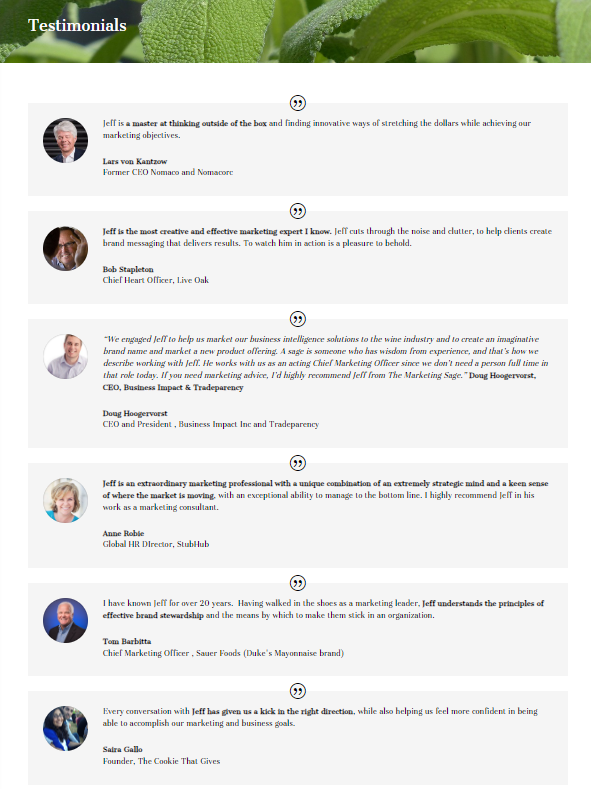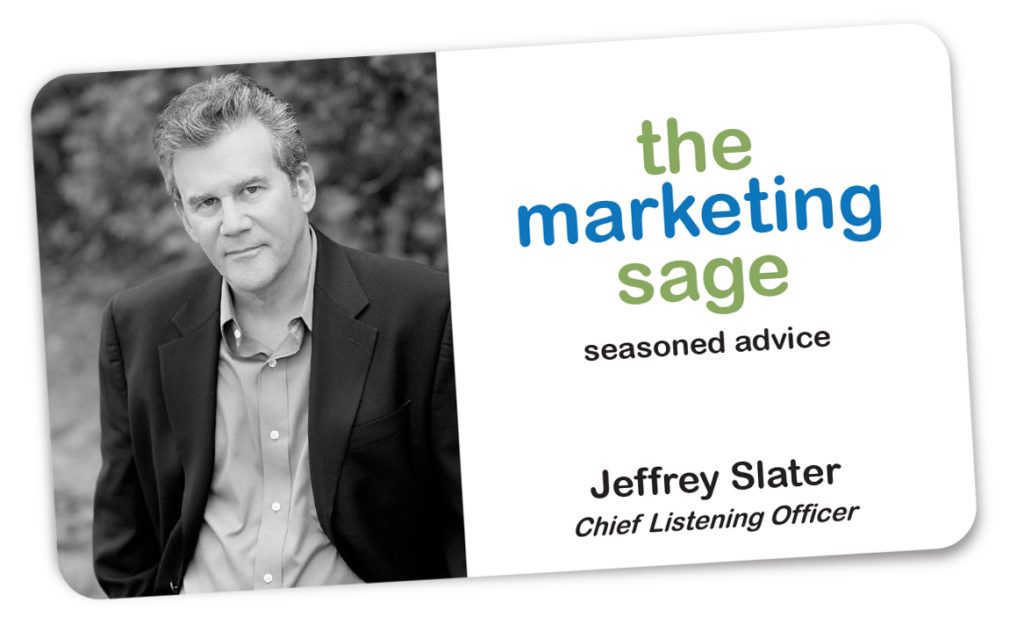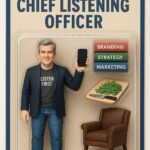Are you considering starting a business as a consultant?
A surprising number of friends and connections are taking the first steps at starting businesses to become a consultant. Some are folks in their sixties, no longer an employee, and trying to figure out their next chapter. We will meet for coffee and lunch, and I’ll share my recommendations with them about what I have been doing for the last seven years building The Marketing Sage Consultancy. I’ll walk them through the steps necessary to get started.
At a recent lunch with a former colleague, I shared nine steps with him on how to start his consultancy.
It dawned on me that I should share these thoughts online since I’m reaching more and more folk who follow me, especially on LinkedIn. And these ideas can be helpful starting a consulting business.
I don’t pretend to have any secrets or extraordinary approaches that will earn you millions overnight. Instead, these steps are a practical approach to marketing yourself as a consultant in whatever field or area you choose.
Step #1 – Consultant Competency
What is your core consultant competency?
At your core, you are probably spent most of your career doing one of these things – sales, marketing, finance, operations, human resources, information technology, or general management. Pick one.
It helps if others see you as having experience, maybe expertise in one of these domain areas. You may have held the title of VP of Sales and Marketing – but pick one where you feel you have your deepest skillset.
Think about specialization – not generalization.
A consultant with expertise in a clearly defined area are hired by people with a pain point they can’t solve with existing staff.
Step #2 – ICP As a Consultant
Who is the ideal client you can serve?
Sorry, the answer can’t be everyone. Maybe you work best with start-ups in the early stages or Fortune 500 companies. Perhaps you excel at growth companies in a specific vertical market (construction, healthcare, food & bev, etc.). You may focus on B Corp or purpose-driven companies in the non-profit world. You might help companies before they try to attract private equity.
Clearly define who you believe you can help and who you will enjoy working with the most.
It doesn’t mean you have to turn down opportunities outside this ICP. (Ideal client profile). But it does mean that you know your target when marketing yourself. And, when you network with others who can bring you leads, they know who you want to serve. The best consultant knows who she can best serve.
Step #3 – Serving Your Clients
What can you do for them?
Think carefully about the kind of services you’ll offer. You might only want to build websites for clients or help with international logistic challenges. Be specific.
In my case, as a marketing consultant, I help my clients do specific marketing activities.
- Marketing research – qualitative or quantitative
- Develop strategic marketing plans – to help budget and staff teams
- Position their brand or company – so they stand out in the market
- Help them name their company – so they are building a valuable brand asset
- Lead generation activities to help them find higher quality leads to fill their sales funnel
- Digital marketing activities like outbound and inbound marketing
- Create core messaging, tagline value propositions, and another essential language
- Stakeholder interviews to understand how customers, employees, or partners view your brand.
Now – I don’t do all of this myself but with a range of freelance and agency partners,
I can solve specific problems for my clients. I have a list of these service offerings so someone I’m connected with can quickly get what I can do to help them solve marketing problems. Spell out the general type of services you can support as a (marketing, sales, finance, human resources, IT or operations) expert. Only include those areas you feel highly confident you can help with and avoid those that aren’t things you have done before.
Step #4 – Consultant Should Be Paid for Experience
Think about how much your time is worth per hour.
If you tell me you are an expert in DEI issues and related HR matters but charge $75 per hour, I may doubt your expert ability.
However, if you have 30 years of experience in this realm, $250 per hour, as an HR consultant signals your value. Some consultants will get hired for a specific project. Once the deliverables are clear, and you understand how much time it will take you to do the work, you can give a fixed price or an hourly rate.
For example, if someone wants to hire you to help them name a new product they are launching, you can charge them a flat fee of $15,000 if you assume that it will take 60 hours of work and you value your time at $250 per hour. Or you can charge them by the hour, not to exceed 60 hours. Some clients want fixed pricing – some want hourly rates.
The key to consulting projects is clarity, scope, time, and what you believe the client is willing to pay for the value you bring them.
Sometimes, a consultant can position their expertise versus junior members of a company. If you are paid $5,000 a month and cost a company $60,000 a year, you may help them in a way that a less experienced person can’t.
Remember, fulltime employees get benefits so for $60,000, they may have a person earning $45,000 with little experience. Think of the value you’ll bring versus someone fulltime who can’t do the things you do.
Step #5 – Share Your Consultant Concept
Write a summary or brief about your business idea as a consultant. And share it with close business friends.
Write a one-to-two-page brief that summarizes the first four steps. Don’t stress about grammar if your writing skills aren’t amazing. You can get help later with the language you use.
This document helps you get out of your head and onto paper what service you’ll focus on, what type of work you’ll do, who you’ll serve, your capabilities, and what you’ll charge. By putting this on paper, you can share it with a few close professional friends who know you.
This isn’t a resume – but a narrative or story about you and what your business can do for others.
Let your friends who you share this brief with ask questions, challenge you and give you feedback. If these folks know you well, they may suggest you think about your expertise differently. They may see you as better suited to serve a different audience. This feedback is helpful before you put together any marketing materials like a website or brochure.
Step #6 – Words to Describe You As A Consultant
See if you can come up with a few specific words that summarize what you can do as a consultant for your clients.
Are you a financial detective? Are you the superwoman of logistics? Are you the Swiss army knife of marketing, or are you a marketing sage? Are you an expert in jumpstarting meaningful conversations or you help woman find their voice at work. What specific and original type of consultant will you be?
See if a few keywords succinctly position or describe who you are and what you are great at doing. Maybe you can close the most complex sales. Or you are the chief heart officer with extraordinary skills in people management issues and nurturing fast-growing work cultures.
When I set up my business, I decided that I would be The Chief Listening Officer for The Marketing Sage.
That was intentional.
People value consultants who listen carefully and don’t assume they understand your business without engaging in discussions. Listening is a core part of my brand and what I consider a superpower.
Another way to think of this exercise is to consider a tool box filled with hundreds of tools. You want to be a specific tool in the tool chest for a client. They pick you when they need a Phillip’s head screwdriver. You need to own some distinct and unique ability to fix a specific challenge for a client.
This isn’t a frivolous exercise. It will help you define your brand.
Step #7 – A Consultant needs Several Testimonials
Get some testimonial quotes from people who know you.

Eventually, someone who learns about your consulting business will ask, why should I trust you. A few testimonials from people who know how great you are at finance or operations can assist you in telling your story.
If you reach out to ten people who know you and explain that you are setting up a consulting business, ask them if they would agree to write a few sentences about your (fill in the blank – sales, marketing, operations, finance, general management) abilities.
You can pick 4 or 5 of the best sentences to tell your story. I like to find people with senior-level titles and well-known companies who will stand up for me. See my testimonial page for examples here.
Step #8 – Marketing Tools for A Consultant
You’ll need marketing tools to help you tell your story.
My advice is that you need just a few simple tools.
First, you’ll use your brief to have an agency or freelancer create a simple website for you. That website will help you tell your story and establish yourself online. Your networking will always link people to this page to give them a complete overview of who you are, what you do, and why people can trust you.
Second, you’ll want a PDF version of your website that you may send to people instead of a link to a website. This ‘one-pager’ can be an alternative way to present yourself.
Third, you’ll want to fine-tune your positioning and message. You can do this yourself or get help from marketing professionals who help create your other assets. This is important because they can help you write a well-crafted summary email you can use to reach out as you network.
Fourth, you’ll want your LinkedIn profile to be in harmony with your website and critical messaging. A small marketing agency can assist you in getting this done. A smart consultant wants consistency across all their platforms.
If you need help with any of this, let me know, and I can recommend small agencies that can do this type of work at reasonable prices.
Step #9 – Your Marketing is Networking
Start to market yourself by networking, not advertising or cold calling.
This is perhaps the most valuable of all the steps. Once you know what you focus on, who you serve, how you can help them, and what makes you different, the best approach to marketing a consulting business is to people who know you.
You probably have hundreds of connections on LinkedIn. People you have worked with who know you professionally or through your local community. Each one is a valuable node in your network. Even if you haven’t been nurturing these relationships over time, you can still reconnect with people who will recall working with you or meeting you annually at conferences.
Here is how it works: You can send each person a message through LinkedIn. I suggest you send 5 per day. The message can read something like this:
Hey Jane, it has been a while since we last connected.
After 15 years at XYZ Company, I have started a business as a consultant specializing in helping starts ups build a sales process. I target young companies in the early stages who need a sales professional with decades of experience in complex sales.
Working in healthcare, affordable housing, and consumer packaged goods makes me qualified to help folks in many industries.
Does anyone come to mind who might benefit from the kind of work I do?
Would you be so kind as to introduce me? My email is jeffslater@themarketingsage.com, and here is a link to my website. www.themarketingsage.com
Thanks for your kindness.
Is there any way I can reciprocate and help you?
If you send out five outreaches daily, you’ll have more than one hundred messages sent after one month. Remember, if you are consulting, you only need a small handful of clients.
Most opportunities usually come from a second-level connection, not a first level. That means that if you and Jane worked together, she might introduce you to someone she works with at a non-profit who started a new business two years ago and is struggling with sales.
How Else Can I Help?
If these nine steps are helpful, please share them with others considering setting up a consulting business. I have a handful of clients starting consulting businesses that I coach and advise. They hire me to advise them one-on-one. Book time to talk with me here.
If there is any secret to building a consulting business, it is persistence in reaching out to your network and finding ways to be helpful first – and ask for help second.
There is no time like the present to reconnect with people you worked with and ask – what’s going on in their world and if is there any way you can be helpful to them.
You can set up a time to chat with me about your marketing challenges using my calendar. Email me jeffslater@themarketingsage.com Call me. 919 720 0995. The conversation is free, and we can explore if working together makes sense. Watch a short video about working with me.
Photo by Vidar Nordli-Mathisen on Unsplash





